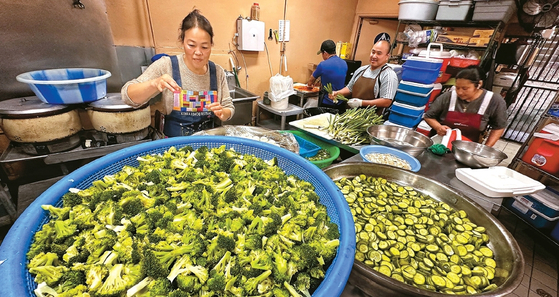
While small businesses struggle due to inflation and a slowing economy, the catering industry has remained robust.
The Koreatown catering industry traditionally focused on serving weddings, birthdays, corporate events, and various other events. However, the onset of the pandemic and subsequent inflation dramatically changed their customer base. They now cater to a broader range of clients, including those in the garment district industry, office workers, hospitals, pharmacies, logistics companies, and senior health centers.
Despite the challenges faced by the restaurant industry, this diversification in customer base has allowed them to maintain steady sales. Notably, as lunch inflation has made it harder for office workers to afford lunch, the number of catering orders has significantly increased.
Catering companies’ lunch prices range from $8 to $14 per person, and most offer free delivery services for orders of three to four items or more in LA Koreatown.
“We’ve raised prices by one or two dollars from before inflation, but not enough to cover the increase in food and labor costs,” said an industry insider. “While most restaurant sales have dropped by more than 20 percent, the catering industry is still seeing steady sales and an expanding clientele.”
Suah Yoo, who works at a hospital office in LA Koreatown, said, “If four people order three servings for $12-13 each to share, it costs less than $10 per person, so it’s the best value for money. The price is also cheaper than most restaurants, and I am satisfied with no tipping, no parking fees, free delivery, and large portions.”
According to the Korea Daily’s Korean Business Directory in 2023, there are currently 20 Korean catering companies in LA and Orange County, including Angel Catering, Paradise Catering, Grace Catering, Song Yi Catering, LA Catering, Banchan A La Carte Catering, Izo Catering, Sang Rok Soo Catering, and Hansol Dosirak, with nearly 30 if you include Korean Market side dishes catering.
The daily order volume of caterers ranges from 350 to 3,500 servings, depending on the company. They prepare food from dawn, start delivering at 9 a.m., and finish around 10 a.m.
“I’ve been catering for 20 years, and there are many orders from companies, groups, and nursing homes,” said Moon Kwon Ju, owner of Izo Catering. “We have 30 employees working from 6 a.m. every day.”
Recently, as cafes and restaurants near the garment district have been closing down, the number of catering orders from showrooms and fashion companies has increased. In addition, as orders from young people and other ethnic groups increase, new menus are being developed, and diets are changing accordingly.
“Companies that have been catering for a long time are basically certified in taste and have a variety of Korean and Western menus,” said Chong K. Lee, owner of Song Yi Catering. “Orders have also increased in areas outside of Los Angeles, such as Santa Fe Springs and Gardena, where fashion factories are located.”
Angel Catering, a long-standing catering company founded in 1987, can prepare up to 7,000 servings per day. The company’s nutritionist from former Shilla Hotel, chefs, and 50 employees prepare an average of 3,000 to 3,500 servings of catering each day.
With the approval of the Ministry of Health and the California Department of Aging, the company also provides daily lunches to more than 15 senior centers. Boxed lunches cost $10.50 plus tax, with free delivery for orders of three.
“When you’re preparing lunches for so many customers every day, you start to see trends in the industry, and lately it’s been e-commerce companies,” said Brian Baek, Manager of Angel Catering. “We’re moving into a new building in Norwalk next year and preparing to launch meal kits.”
“Inflation has made people more careful about spending money on food,” said an industry insider. “We expect the number of companies and office workers using catered lunches to continue to grow amidst lunch inflation.”
BY EUNYOUNG LEE, JUNHAN PARK [lee.eunyoung6@koreadaily.com]




